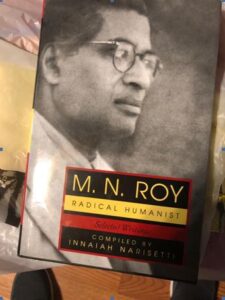
When humanism was first receiving widespread public attention in the West, through such publications as The Humanist Manifesto in 1933, unbeknownst to most Westerners humanism was proceeding on a parallel track in India, largely due to the efforts of philosopher and political activist M.N. Roy (1887-1954). Sadly, it wasn’t until the early fifties, at the end of Roy’s life that European humanists began to notice his work. To rectify the unfortunate neglect in the West of one of India’s premier intellectuals, philosopher Innaiah Narisetti has compiled this new collection of Roy’s most significant works. Roy conceived of humanism as a scientific, integral, and radically new worldview. Among many interesting selections in this volume, Roy’s “Principles of Radical Democracy: 22 Theses” is especially representative of his thinking. Here he emphasized ethics and eschewed supernatural interpretations as antithetical to his scientifically oriented conception of “new humanism.” He also underscored the importance of universal education to make average people scientifically literate and to teach them critical thinking. Roy was not only a thinker but a doer as well. He spent six years in an Indian prison during the 1930s for opposing the British rule of India. For humanists, philosophers, political scientists, and others, M.N. Roy’s unique and still very relevant view of humanism will have great appeal and broad application beyond its original Indian context.
From the Inside Flap
A revolutionary twentieth-century philosopher, M.N. Roy pushed humanist thought along a track parallel to that of the West. By the time philosopher and poet Corliss Lamont printed his PHILOSOPHY OF HUMANISM in the United States in 1949, Roy had already published NEW HUMANISM in the East two years earlier. Yet Roy remained an ignored philosophical figure in the West until well after his death. In M.N. ROY: RADICAL HUMANIST, philosopher Innaiah Narisetti presents a compelling collection of Roy’s most important writings, providing new insight into the humanist’s profound influence.
Roy’s humanist philosophy stresses that the study of history is imperative for a proper understanding of society, deriving his principles from modern science, which is progressive and self-correcting and wears a human face. During World War II, Roy was the only Indian philosopher who saw nationalism as an antiquated cult, and he condemned communism and fascism as twin forms of irrationalism. Roy advocated a cooperative commonwealth with human values as a better alternative to the prevalent thought of the time, particularly in India.
Roy’s most famous work, REASON, ROMANTICISM, AND REVOLUTION, published in 1952, named the basic urges of humans–the search for truth and the quest for freedom. Through the former, Roy argued, humans could achieve the latter. In M.N. ROY, Narisetti reproduces two important chapters, “The Way Out” and “New Humanism.” Erich Fromm, author of SANE SOCIETY, admired Roy’s volume so much that he paid tribute to it in his own book–albeit a year after Roy’s death.
Also included in this compilation are two chapters from NEW HUMANISM, “The Failure of Philosophy” and “A New Political Philosophy,” which answer the question of whether politics has a rational foundation. Many of Roy’s humanist writings were published posthumously by his second wife, Ellen, and are contained in this text.
Roy’s famous “Principles of Radical Democracy–Twenty-Two Theses,” which concludes this collection, describes a person’s place in the universe and in society. He avoids a supernatural element–a problem plaguing countries like India–denying its role in dictating moral behavior.
Although Roy developed his humanist thought in an Indian context, his writings nonetheless have broad appeal and implications. Narisetti furnishes a map to Roy’s New Humanism, providing readers with an indispensable guide to a philosophy that has received little attention in the United States.
About the Author
Innaiah Narisetti, Ph.D. (Hyderabad, India), is the chairman of the Center for Inquiry, India, the former general secretary of the Indian Radical Humanist Association, and the author of Let Sanity Prevail, M.N. Roy: Radical Humanist, and four other books.
